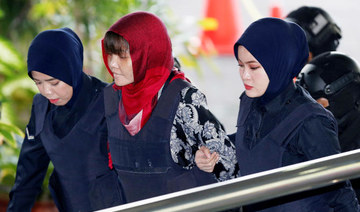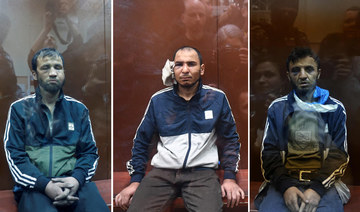WASHINGTON: A South Carolina man has been charged in the murder of a University of South Carolina student who may have gotten into her killer’s car mistakenly believing that it was her Uber ride, police said.
Nathaniel Rowland, 24, was charged with the murder and kidnapping of Samantha Josephson, 21, who was last seen outside of Five Points bar in Columbia, South Carolina early Friday morning, Columbia Police Chief William Holbrook said during a news conference on Saturday evening.
Her friends called the authorities to report a missing person about 12 hours later after they had not seen Josephson since she left the bar the night before, he said.
“We believe that she simply mistakenly got into this particular car thinking that it was an Uber ride,” Holbrook said. “She opened the door, got into it and departed with the suspect driving.”
Two hunters found her body in a wooded area along a dirt road in a rural part of a nearby county a few hours after her friends called police, Holbrook said.
“Our hearts are broken. There is nothing tougher than to stand before a family and explain how a loved one was murdered,” he said. “It was gut-wrenching.”
Her father, Seymour Josephson of Robbinsville, New Jersey, wrote a post on Facebook about his daughter’s death.
“It is with tremendous sadness and of a broken heart that I post this! I will miss and love my baby girl for the rest of life,” he wrote.
Police received a number leads and were able to determine through video that the vehicle Josephson got into was a black Chevrolet Impala. Early on Saturday morning, an officer spotted a vehicle matching the description of the car two blocks from the tavern and initiated a traffic stop, Holbrook said.
The officer took the suspect into custody after a short foot chase. Police later found blood and her cell phone along with several cleaning items in his car. Blood was also found in the car’s trunk, Holbrook said.
Uber Technologies Inc. launched a public awareness campaign in July 2017 regarding Uber scams and how riders can avoid getting into the wrong car, suggesting that they check the app to make sure that the car matches the one that they ordered.
If the information doesn’t match up, do not get into the car, the company wrote on a blog post.
Murdered South Carolina student may have thought car was her Uber ride -police
Murdered South Carolina student may have thought car was her Uber ride -police
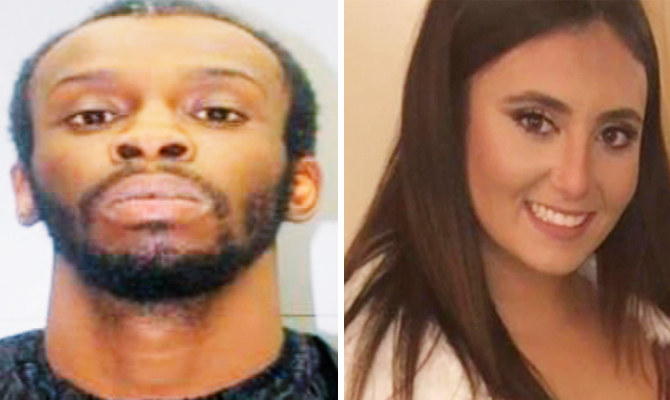
India’s new government will be spoilt for choice with $25 billion extra in kitty

- Indian central bank has announced record 2.11 trillion rupees dividend transfer to government, more than double New Delhi’s and street estimates
- Surplus fund can help the new government bring down fiscal deficit by 0.3 percent of GDP or increase spending on infrastructure or “populist” stimulus
MUMBAI/NEW DELHI: India’s incoming government will be greeted with a $25 billion cheque from the central bank, giving it the option to either boost spending or narrow the fiscal deficit quicker, both of which will be cheered by investors.
On Wednesday, the Reserve Bank of India (RBI) announced a record 2.11 trillion rupees dividend transfer to the government, more than double New Delhi’s and street estimates, leading to a decline in bond yields and a rise in equity markets.
The surplus fund can help the new government, which will take charge after the current elections, bring down its fiscal deficit by 0.3 percent of gross domestic product (GDP) or increase spending on infrastructure or “populist” stimulus, Citi Research’s Samiran Chakraborty said.
“The bond markets would likely hope that the government follows the deficit reduction route, while the equity markets would likely prefer the government taking the expenditure increase one,” said Chakraborty.
During the election campaigns, the opposition Congress promised annual cash handouts of 100,000 rupees ($1,202.07) to poor women and unemployed youth. The party’s star campaigner Rahul Gandhi also promised debt waiver for farmers.
But Prime Minister Narendra Modi of the Bharatiya Janata Party (BJP) has avoided promising any new major welfare measures.
“Despite higher revenue from the RBI dividend, we doubt the government would opt for more populist expenditure in its budget, if the government is BJP-led,” said Shreya Sodhani, an economist at Barclays.
“The current government has not shown a disposition toward populist spending even in an election year.”
The BJP-led government resisted the temptation of spending trillions of rupees on schemes for the poor in its last budget before the election while raising spending on infrastructure to 11.11 trillion rupees, more than three time the sum spent in 2019.
QUICKER FISCAL CONSOLIDATION
The new government will likely present the final budget in July, leaving the administration with only eight months to spend funds allocated to them.
Government spending has been slow so far in the year, with the start of elections from April. Tax collections, meanwhile, have been strong due to buoyancy in the economy.
India collected a record 2.10 trillion rupees in goods and services taxes in April, the first month of the financial year, ensuring the government is on track to meet its planned fiscal goal of 5.1 percent of GDP this year.
This could mean the government will lean toward using the bumper dividend for fiscal consolidation.
There is scope for a slight reduction in the targeted fiscal deficit for the current year, said Ashima Goyal, a professor and an external member of the country’s monetary policy committee, who expects the government to comfortably achieve the targeted fiscal deficit of 4.5 percent by 2025/26.
India’s fiscal deficit ballooned to 9.2 percent during the pandemic but the government has steadily brought this down.
But bringing down the deficit by 130 basis points from 5.8 percent in 2023/24 was seen as challenging and dependent on one-off revenue from either privatization or auction of telecom spectrum.
($1 = 83.1900 Indian rupees)
Armenia returns four border villages to Azerbaijan
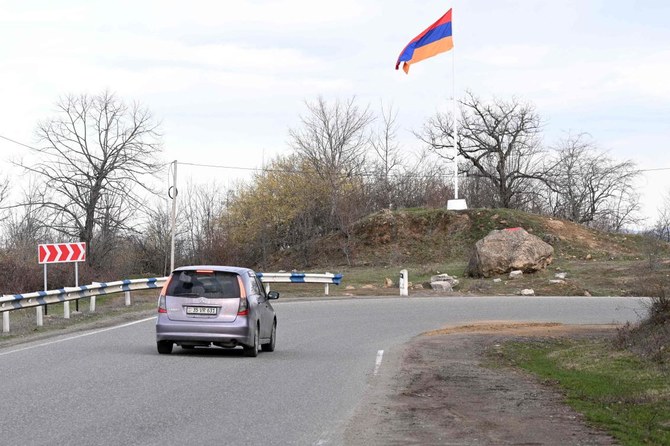
YEREVAN: Armenia has returned to Azerbaijan four border villages it had seized decades ago, officials in Yerevan and Baku confirmed Friday, in a key step toward normalizing ties between the historic rivals.
The two ex-Soviet countries in the Caucasus fought two wars in the 1990s and in 2020 for control of the breakaway region of Nagorno-Karabakh.
Azerbaijan recaptured it last year in a lightning offensive, ending three decades of Armenian separatist rule and prompting more than 100,000 locals to flee into Armenia.
Armenian Prime Minister Nikol Pashinyan had agreed in March to return the four abandoned villages seized by his country in the 1990s, as part of efforts to secure a lasting peace agreement between the countries.
On May 16, they agreed on the demarcation of 12.7 kilometers (almost seven miles) of their border that returned the villages of Baghanis Ayrum, Ashaghi Askipara, Kheyrimli and GhizilHajjili to Azerbaijan.
Armenia’s security service confirmed Friday that its border guards had “officially” taken up new positions reflecting the border deal and ceded the villages to Azerbaijan’s control.
Azerbaijan’s Deputy Prime Minister Shahin Mustafayev meanwhile announced that his country’s border guards had taken control of the four settlements.
Armenian residents of nearby settlements say the move could cut them off from the rest of the country and accuse Pashinyan of unilaterally giving away territory without any guarantees in return.
The premier’s move has sparked weeks of anti-government protests in Armenia, with thousands of demonstrators led by charismatic cleric Bagrat Galstanyan demanding Pashinyan’s resignation.
A fresh anti-government protest is scheduled for Sunday.
Pashinyan last week described the deal as a “very important milestone for further strengthening Armenia’s sovereignty and independence.”
The territory is of strategic importance for landlocked Armenia because it controls sections of a vital highway to Georgia.
EU’s Borrell says recognizing Palestine is not a gift to Hamas
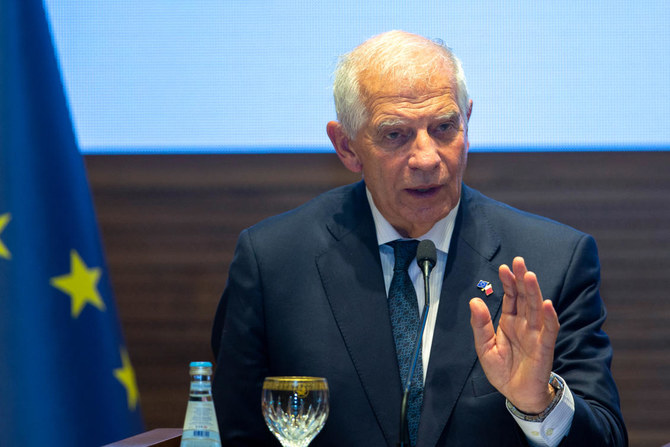
MADRID: European Union’s foreign policy chief Josep Borrell said Friday said that recognizing a Palestinian state was not a gift to Hamas.
Ireland, Norway and Spain said on Wednesday they would recognize a Palestinian state on May 28, to help secure a halt to Israel’s Gaza offensive after the Hamas attack on Oct.7 and revive peace talks that stalled a decade ago.
“Recognizing the Palestinian state is not a gift to Hamas, quite the contrary,” he said. “The Palestinian authority is not Hamas, on the contrary they are deeply confronted.”
He added the EU already talked, financed and met the Palestinian authority.
“Every time someone makes the decision to support a Palestinian state, ... the reaction of Israel is to transform it in an antisemitic attack,” he added.
Philippines opens coast guard post after China build-up
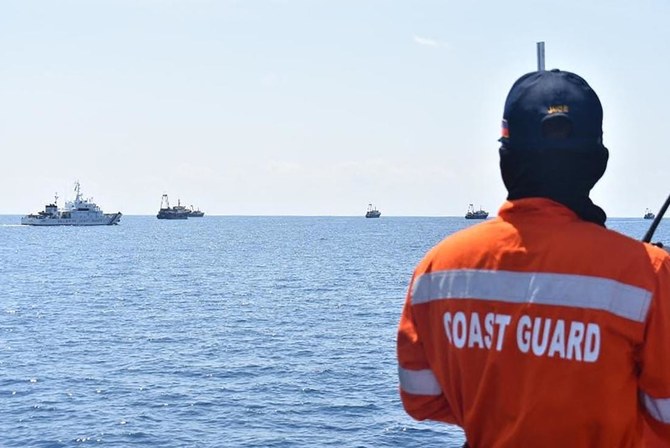
- China and the Philippines are enduring a bitter diplomatic dispute over rival claims to parts of the South China Sea
- Coastguard says the post will be used to gather data
MANILLA: The Philippines said Friday it had opened a coast guard post in the country’s far north to boost security following China’s “military build-up” near Taiwan over the past two years.
The outpost “shall gather essential maritime data and intelligence, enabling the (Philippine Coast Guard) to respond effectively to threats such as illicit trade, trafficking, piracy, and foreign intrusions,” National Security Adviser Eduardo Ano said in a statement.
“In 2022, the area around Itbayat witnessed a military build-up as China responded to political developments between Taiwan and the United States,” Ano said, announcing the opening of the station on the Philippines’ northernmost inhabited island.
“Securing peace, stability, and freedom of navigation along the Luzon Strait is crucial for ensuring Philippine national security and economic prosperity,” he added.
Itbayat is located around 150 kilometers (93 miles) south of Taiwan’s south coast.
China and the Philippines are enduring a bitter diplomatic dispute over rival claims to parts of the South China Sea.
China has built artificial islands and military installations in waters close to the Philippines.
China’s efforts to enforce its claims have in recent years including water cannon attacks by China Coast Guard vessels that damaged Philippine government boats and injured several crew members.
Itbayat is just outside the area designated by a vaguely defined map of dashes that China uses to claim most of the South China Sea.
Ano made no reference to war games that China began on Thursday in which it encircled Taiwan with warplanes and naval vessels.
Russia says Daesh behind deadly Moscow concert hall attack
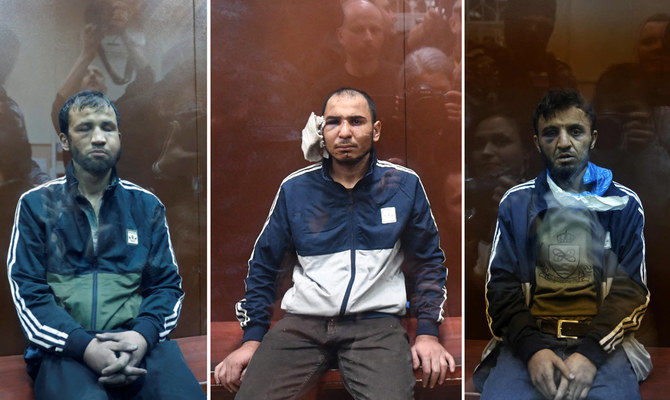
Moscow: Russia on Friday admitted for the first time that Daesh coordinated the deadly concert hall attack in Moscow in March.
“In the course of the investigation... it has been established that the preparations, the financing, the attack, and the retreat of the terrorists were coordinated via the Internet by members of Khorasan Province (IS-K),” a branch of Daesh active in Afghanistan and Pakistan, Alexander Bortnikov, the head of FSB, was quoted as saying by the RIA Novosti news agency.
At least sixty people have been killed after gunmen stormed a concert hall near Moscow in March, one of the deadliest attacks on Russia in decades.
Gunmen opened fire at a rock concert leaving dead and wounded before a major fire spread through the theater, Moscow’s mayor and Russian news agencies reported.
Putin has called the attack back in March as “a bloody, barbaric terrorist act” and said Russian authorities captured the four suspects as they were trying to escape to Ukraine through a “window” prepared for them on the Ukrainian side of the border.
Russian media broadcast videos that apparently showed the detention and interrogation of the suspects, including one who told the cameras he was approached by an unidentified assistant to an Islamic preacher via a messaging app and paid to take part in the raid.
Putin didn’t mention Daesh, known as Daesh in Arabic, in his speech to the nation, and Kyiv accused him and other Russian politicians of falsely linking Ukraine to the assault to stoke fervor for Russia’s fight in Ukraine, which recently entered its third year.
US intelligence officials said they had confirmed the Daesh affiliate’s claim. “ISIS bears sole responsibility for this attack. There was no Ukrainian involvement whatsoever,” National Security Council spokeswoman Adrienne Watson said in a statement. The US shared information with Russia in early March about a planned terrorist attack in Moscow, and issued a public warning to Americans in Russia, Watson said.
The raid was a major embarrassment for the Russian leader and happened just days after he cemented his grip on the country for another six years in a vote that followed the harshest crackdown on dissent since the Soviet times. Some commentators on Russian social media questioned how authorities, who have relentlessly suppressed any opposition activities and muzzled independent media, failed to prevent the attack despite the US warnings.
Daesh, which fought against Russia during its intervention in the Syrian civil war, has long targeted Russia. In a statement posted by the group’s Aamaq news agency, the Daesh Afghanistan affiliate said that it had attacked a large gathering of “Christians” in Krasnogorsk.




